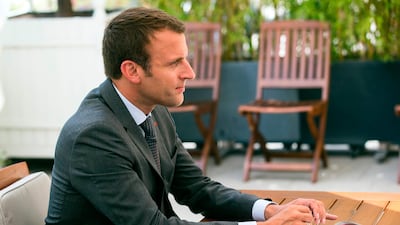Emmanuel Macron has won the hearts of France’s business leaders, who are counting on him to push through radical reforms to sustain an economic recovery that’s been a long time coming.
Executives from Société Générale to building materials firm Cie de Saint-Gobain have spoken of a brighter mood since the new president was elected in May, partly on hopes that he will help deliver the sustained robust expansion his predecessors could not inspire. Anticipation of tax rebates, tighter government spending and an unprecedented clipping of protective labour laws have also perked up confidence readings.
Business confidence is near a six-year high, while optimism among consumers has also steadily improved. The Bank of France will release its July sentiment reading on Wednesday, and will also publish its first estimate for third-quarter growth.
“Macron’s election has stoked up hope,” said Philippe Waechter, the director of economic research at Natixis Asset Management. “Higher investment and hiring prospects in surveys reflect a honeymoon that can put an end to French growth lagging euro-region peers, provided the Élysée lives up to expectations.”
The president wants to pursue the deregulation many other European countries already implemented to improve their growth potential. While corporate leaders’ faith is providing impetus for change, he needs their view to spread as his narrow voter base exposes him to traditionally potent local resistance. Mr Macron, a former banker, is not aligned with a major party and never held elected office before he was chosen amid record abstention.
France’s success also has implications for the 19-nation euro zone, where its second-largest economy has long failed to provide support, leaving Germany as the solo engine. Better growth would broaden the recovery and help an upswing which the European Central Bank is banking on to boost inflation.
_______________
Read more:
France and Germany aim to tighten tax regime on foreign firms
Paris vows to beat Frankfurt in fight for financial power post-Brexit
Euro zone regaining health but risks remain
_______________
“There is definitely a better mood in France, a better level of confidence,” said Frederic Oudea, the chief executive of Société Générale , said last week. France’s third-largest bank saw its long-term investment loans to small and medium-sized firms increase 10 per cent in the second quarter, he said.
The economy is currently enjoying its strongest continuous expansion since 2011, with GDP up 0.5 per cent in second quarter. The benchmark CAC 40 Index has risen 7.3 per cent this year, ahead of the Stoxx Europe 600 Index.
The composite PMI remains elevated, even though it’s slipped for the past two months, signalling some softening. Economists expect 0.4 per cent growth this quarter, according to a Bloomberg survey.
“Growth may be ebbing a little, but should remain fast enough to help unemployment drift lower,” said Bloomberg Intelligence economists including Jamie Murray on Tuesday. “Macron has a rare opportunity to lift the economy’s longer-term prospects by pushing through radical reforms aimed at making the labour market more dynamic.”
Mr Macron already has business-friendly credentials. As an adviser to the former president François Hollande, he enacted steps such as €40 billion (Dh172.52bn) in tax credits.
“I have started to see in the last few weeks a small change of attitude which is positive,” said the Saint-Gobain boss Pierre-Andre de Chalendar said in July. “I am more optimistic about France than I was six months ago and also than I was two months ago.”
Mr Macron’s toughest task may be overhauling labour laws. Disappointing job creation was among the reasons Mr Hollande became the first president in half a century not to seek re-election. Despite a drop in approval rating, the government spokesman Christophe Castaner said last week the timetable is unchanged, with new rules to be enforced next month.
“France still has a level of growth which is beneath its potential,” said the finance minister Bruno Le Maire told Bloomberg last week, maintaining a 1.5 per cent growth forecast for 2017. “France must do better than its major partners such as Germany, not worse. That’s our target and we’ll stick to it.”

